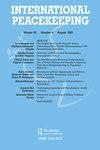Responding to Sexual Violence: How (De-) Politicization and Technicalization Shape Donor-Funded Interventions
IF 1.3
2区 社会学
Q2 INTERNATIONAL RELATIONS
引用次数: 0
Abstract
ABSTRACT This article introduces an analytical framework for studying and interpreting the sometimes surprisingly different ‘shapes’ (key topics and approaches) of donor-funded responses to sexual violence in and after armed conflict. Our framework highlights processes of politicization, depoliticization, and technicalization and their influence on interventions. Drawing on available studies, published documents, and our own field research in the Democratic Republic of Congo (DRC) and Sierra Leone, we show that donor-funded responses to sexual violence since the early 2000s have taken remarkably different shapes – despite the emergence of influential international policy narratives and roughly similar forms of sexual violence in both contexts. A focus on context-specific processes of politicization, depoliticization, and technicalization reveals how these differences came about and persisted over time. (De-)Politicization and technicalization of sexual violence as a ‘weapon of war’ in DRC have led to medicalized and security-centred statebuilding interventions in the county's eastern conflict zones. By contrast, donor-funded responses in Sierra Leone framed and addressed sexual violence as ‘domestic violence’ even before the war had officially ended. We find that these different shapes emerged from initial differences in (de)politicization and technicalization processes driven by different ‘first responders’ in both contexts, which created enduring path dependencies.应对性暴力:(去)政治化和技术化如何塑造捐助者资助的干预措施
摘要本文介绍了一个分析框架,用于研究和解释捐助者资助的应对武装冲突中和冲突后性暴力的“形式”(关键主题和方法)有时惊人地不同。我们的框架强调了政治化、非政治化和技术化进程及其对干预措施的影响。根据现有的研究、已发表的文件以及我们自己在刚果民主共和国和塞拉利昂的实地研究,我们表明,自21世纪初以来,捐助者资助的对性暴力的反应呈现出明显不同的形式——尽管在这两种情况下都出现了有影响力的国际政策叙事和大致相似的性暴力形式。对政治化、非政治化和技术化的具体过程的关注揭示了这些差异是如何随着时间的推移而产生和持续的。(De)在刚果民主共和国,性暴力作为“战争武器”的政治化和技术化导致了该县东部冲突地区的医疗化和以安全为中心的建国干预。相比之下,在塞拉利昂,捐助者资助的应对措施甚至在战争正式结束之前就将性暴力定义为“家庭暴力”并加以处理。我们发现,这些不同的形状源于在两种情况下由不同的“第一反应者”驱动的(去)政治化和技术化过程的最初差异,这产生了持久的路径依赖性。
本文章由计算机程序翻译,如有差异,请以英文原文为准。
求助全文
约1分钟内获得全文
求助全文

 求助内容:
求助内容: 应助结果提醒方式:
应助结果提醒方式:


